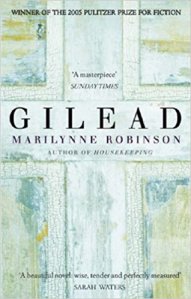
I was so enraptured by the beauty of the language in Housekeeping by Marilynne Robinson that I picked up Gilead just a few weeks later. In the past I’ve been disappointed when I’ve read an author’s other works in such quick succession (and should know better than to continue doing this), but happily, reading Gilead added to my appreciation of Marilynne Robinson’s work.
Gilead is a small prairie town in Iowa and the hometown of the Reverend John Ames. The story is set in 1956 and is told as a letter from the elderly Reverend Ames to his seven-year old son. Aware that he will not live for much longer, he writes in his letter what he wants his son to learn as he becomes a man. Reverend Ames’ love for his son shows in every word he writes.
You and your mother were making sandwiches with peanut butter and apple butter on raisin bread. I consider such a sandwich a great delicacy, as you are clearly aware, because you made me stay on the porch until everything was ready, the milk poured and so on. Children seem to think every pleasant thing has to be a surprise.
The letter also describes how the Reverend Ames fell in love his son’s mother even though he was old and she was young, and the couple’s life experiences and education were vastly different from each others’. It also tells the story of the Reverend Ames own father and grandfather, both of whom were preachers, one a pacifist and one who “preached men into the Civil War.” The letter also tells the story of the Reverend Ames’ namesake, John Ames Boughton, the troubled adult son of Reverend Ames’s dearest friend, Reverend Boughton.
Reverend Ames’ first wife, Louisa died, along with their baby, in childbirth. Reverend Ames was hurt and offended when one of the Reverend Boughton’s enormous, healthy family was named after him. Reverend Ames and John Ames Boughton have an uneasy relationship from the boy’s childhood and Reverend Ames’ mistrust worsens when John Ames Boughton becomes friends with Reverend Ames’ wife Lila and is kind to their son.
Reverend Ames’ life work was preaching, and he leaves behind him every sermon he ever preached. He is a loved and respected member of his community although he admits he struggles with his temper. This fault is not evident in the letter he writes, rather it is a fault which he owns up to and cautions his son to be aware of in himself.
Every single one of us is a little civilization built on the ruins of any number of preceding civilizations, but with our own variant notions of what is beautiful and what is acceptable – which, I hasten to add, we generally do not satisfy and by which we struggle to live.
Reverend Ames is humanised by stories and pranks from his youth, such as putting a hay wagon on top of the Gilead courthouse roof with his friends one night.
Sinners are not all dishonorable people, not by any means. But those who are dishonorable never really repent and never really reform. Now, I may be wrong here. No such distinction appears in Scripture. And repentance and reformation are matters of the soul which only the Lord can judge. But, in my experience, dishonor is recalcitrant. When I see it, my heart sinks, because I feel I have no help to offer a dishonorable person. I know the deficiency may be my own altogether.
I’m not religious but knew that the name of the town where this story is set, Gilead, has Christian connotations, so investigated and found that one of the meanings of Gilead is ‘hill of testimony.’ The aptness of this carefully chosen name is reflective of this author’s work, every single word is considered, with no other word so meaningful or suitable in its place. The story is told slowly too, and I read Gilead slowly and carefully in order not to miss anything by skimming or racing ahead. I felt worried about various character’s motives and morals during some parts of this book, but was ultimately left with a feeling of hope and the sense that life is indeed a gift, regardless of any religious overtones. Non-religious types reading Gilead should be able to suspend disbelief as they would when reading science-fiction, as this is Reverend Ames’ story, and his own faith is an enormous part of his story.
Gilead, which won the Pulitzer Prize for fiction in 2005, is followed by Home, which I intend reading soon. The third book in the trilogy is Lila, which I believe is the story of Reverend Ames’ wife.
Comments on: "Gilead by Marilynne Robinson" (7)
Great review, and I’m glad you loved this one as much as I did. So beautifully written, and the touches of humour lift the tone. Totally agree – it’s life-affirming even for those of us who aren’t religious… 🙂
Thank you. I’m really looking forward to reading Home and Lila too.
Me too!
I simply MUST read some Marilynne Robinson – I MUST! Great review, Rose 🙂
Thank you 🙂 I’ll look forward to reading your review when you do get around to reading something by Marilynne Robinson!
Gosh. One of my favorite authors. I read Gilead and then Lila and now I’m going back and reading Home. Such thoughtful, gentle, contemplative writing. I have had friends say that they didn’t find this an easy read. I can see that-not a lot of “action” the way we might be used to in other fiction. But what a joy to read.
I’m still looking forward to reading Lila and Home, and can imagine re-reads in my future, too.
You’ve got me wondering if gentler, contemplative works (lovely description, by the way) require more concentration. I know I skim when reading fast-paced stories.